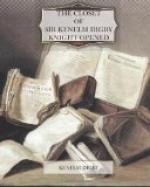His education was that of a dilettante. A year in Spain, in Court and diplomatic circles, was followed by a year at Oxford, where Thomas Allen, the mathematician and occultist, looked after his studies. Allen “quickly discerned the natural strength of his faculties, and that spirit of penetration which is so seldom met with in persons of his age.” He felt he had under his care a young Pico di Mirandola. It may have been now he made his boyish translation of the Pastor Fido, and his unpublished version of Virgil’s Eclogues. As to the latter, the quite unimportant fact that he made one at all I offer to future compilers of Digby biographies. Allen till his death remained his friend and admirer, and bequeathed to him his valuable library. The MSS. part of it Digby presented to the Bodleian. A portion of the rest he seems to have kept; and though it is said his English library was burnt by the Parliamentarians, it seems not unlikely that some of Allen’s books were among his collection at Paris sold after his death by the King of France.
But Kenelm was restlessly longing to taste life outside academic circles, and already he was hotly in love with his old playmate, now grown into great beauty, Venetia Anastasia Stanley, daughter of Edward Stanley of Tonge, in Shropshire, and granddaughter of the Earl of Northumberland. If I could connect the beautiful Venetia with this cookery book, I should willingly linger over the tale of her striking and brief career. But though the elder Lady Digby contributed something to The Closet Opened, there is no suggestion that it owes a single receipt to the younger. Above Kenelm in station as she was, he could hardly have aspired to her save for her curiously forlorn situation. Mother-less, and her father a recluse, she was left to bring herself up, and to bestow her affections where she might. To Kenelm’s ardour she responded readily; and he philandered about her for a year or two. But his mother would hear nothing of the match; and at seventeen he was sent out on the grand tour, the object of which, we learn from his Memoirs, was “to banish admiration, which for the most part accompanieth home-bred minds, and is daughter of ignorance.” Kenelm proved better than the ideal set before him; and the more he travelled the more he admired.
Into this tale of love and adventure I must break with the disturbing intelligence that the handsome and romantic and spirited youth was in all probability already procuring material for the compilation on Physick and Chirurgery, which Hartman, his steward, published after his death. It was not as a middle-aged bon viveur, nor as an elderly hypochondriac, that he began his medical studies, but in the heyday of youth, and quite seriously, too. The explanation brings with it light on some other of his interests as well. When he set out on the grand tour, his head full of love and the prospects of adventure,




